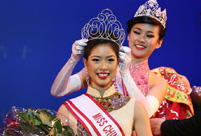

As the Communist Party of China (CPC) devoted more efforts to tightening regulations on corruption, China’s anti-graft drive has captured recognition from the public. This endeavor is expected to be continued this year.
Since the CPC Central Committee revised its regulations on disciplinary penalties last October, the general public have held CPC members’ behavior to higher standards. Experts believe that this also, on some levels, symbolizes the enhanced restraint of regulations in China.
“Power should be exercised within the cage of regulations," said Chinese President Xi Jinping at a meeting of the top anti-corruption body of the CPC.
Xi’s remarks, echoed by the people’s expectation, showed the strong determination of Chinese leaders to build clean governance by addressing the root causes of corruption through effective disciplinary system.
In a bid to strike against corruption, as early as December 2012, the CPC Central Committee introduced its "eight-point" bureaucracy and formalism-fighting guidelines, urging officials to resist pomp, ceremony and reduce bureaucratic visits and meetings.
In the guidelines, explicit requirements were given on how to better serve the public by further honing the Party’s working style.
The CPC Central Commission for Discipline Inspection and discipline watchdogs at all levels later strengthened their supervision and punishments against those violating the rules.
Paired with the tightened supervision, the guidelines sent a strong message to the Party members. Instances of inappropriate behavior such as holding banquets with public cash significantly dropped afterwards.
Based on such anti-corruption practices, the CPC Central Committee amended a series of standards, norms and rules for the Party in 2015, where previous achievements or innovations were included for guidance.
For example, in the inspection work regulation, “special inspection tours” were required for relevant authorities, while in another regulation on disciplinary penalties, CPC members’ discipline violations were further detailed.
In 2016, China will devote more efforts in drafting regulations. The country is expected to improve its intra-Party supervision system, set up a national supervision mechanism covering State organizations and civil servants, and establish an accountability regime.
In addition, major violation cases will be made public. As China pledges more regulations on corruption, the public now bear more expectations toward the anti-corruption goals set by Xi , specifically that “people do not dare to, are not able to and cannot easily commit corruption.”

 China has world's largest high-speed rail network
China has world's largest high-speed rail network Top beauties in Chinese provinces
Top beauties in Chinese provinces 600 people attend Lusheng playing contest in S China
600 people attend Lusheng playing contest in S China Engineer troop builds bridge in real combat conditions
Engineer troop builds bridge in real combat conditions You can urinate in public in Chongqing
You can urinate in public in Chongqing Rice terrace scenery in southwest China's Yunnan
Rice terrace scenery in southwest China's Yunnan 2016 Miss Chinatown USA pageant held in San Francisco
2016 Miss Chinatown USA pageant held in San Francisco Ancient pagodas across China
Ancient pagodas across China Wedding dress show up in the air
Wedding dress show up in the air Top 20 hottest women in the world in 2014
Top 20 hottest women in the world in 2014 Top 10 hardest languages to learn
Top 10 hardest languages to learn 10 Chinese female stars with most beautiful faces
10 Chinese female stars with most beautiful faces China’s Top 10 Unique Bridges, Highways and Roads
China’s Top 10 Unique Bridges, Highways and Roads Harris is making waves in S.China Sea
Harris is making waves in S.China Sea With new plant, Airbus seeks to secure China market share
With new plant, Airbus seeks to secure China market share Chinese sound off on America’s loudest presidential hopeful
Chinese sound off on America’s loudest presidential hopeful 40 years after Cultural Revolution, repentance of Red Guards is still rare
40 years after Cultural Revolution, repentance of Red Guards is still rareDay|Week